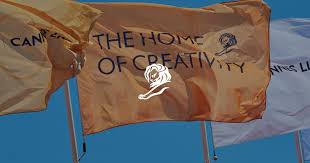
It’s been a controversial Cannes, as Campaign have pointed out. The Economist was also in Cannes and gave this headline to its report from the Croisette: “Creative destruction: The new age for admen.”
Although most of the activity in Cannes takes place in a very small, very hectic town centre, it is no longer just one festival.
If you have a Palais pass, it’s one thing.
If you have the ambition/energy to attend all the Spotify parties, it’s another thing.
The festival outside the festival is another again, fantastic sessions at the beaches that are open to more people than have a pass, and amazing content always at the FQ lounge where Shelley Zalis curates panels that never fail to inspire and the air con is cold and there’s much kindness (thank you for my ear plugs – they were a life saver).
And then there are the exclusive dinners and private meetings where the people at the top of the current hierarchy have their quiet conversations which have a huge impact on thousands of people’s careers and lives.
I tried to make as many connections and get as much inspiration as I could. Cannes might have been the origin of the term FOMO as there is much too much to do, hear, see and explore.
Here’s 5 take outs.
- CMOs roles are evolving. Some are talking about giving over control of their brands to creators and influencers. In my first book Tell the Truth, honesty is your most powerful marketing tool published in 2012 we foreshadowed this, saying, as social media just began to gain traction and Amazon disrupted shopping: “What people say about you is much more important and powerful than what you say about your brand yourself”. This requires a different approach to brand building, one that incorporates every aspect of paid, owned, earned and shared. Siloes at client companies will make it impossible to win in this environment. Claudine Cheever, who is VP global brand and marketing at Amazon, talked about fostering a culture of creativity and democratising decision making: “If you know it’s going to succeed then it is not an experiment…. Push down decision making, encourage risk taking.” Najoh Tita-Reid, global brand and experience officer at Mars Petcare said: “I’m here to inspire, freedom within a framework, not control”. Shannon Duffy from Asana pointed out the importance of the role as a way of harnessing employees energy for the brand; “CMOs drive the positive culture of a company in a way that other c suites cannot.”
- Alex Jenkins, editorial director at Contagious is depressed. In a talk entitled “How to win in 2030” inevitably he took a dystopian view of what is to become of us in an age of AI. What with the environment getting worse, the WEF forum predicting over a third of businesses reducing workforces because of AI, increased wealth from AI only benefiting the top of organisations and increased loneliness because of tech it was hard to stay positive. He did reveal his tips for winning which revolved around leveraging Maslow’s hierarchy of needs. If brands defend those layers, from physical safety through to self actualisation, Jenkins said, then they will become essential to people as they become scaffolding to protect themselves from the losses of the era of robots.
- At the Future of a Media Organisation panel compered by Mediasense CSO Ryan Kansinger there was vigorous discussion about priorities for the next year. Sir Martin Sorrell was eloquent about the need for proper leadership: managing integration is not enough. AI is forcing businesses to rethink. “If I were to write a book, I would say that the achilles heel of any organisation is politics.” The marketing representation on the panel (Ron Amram (Mars), Olya Dyachuk (Heineken), and Ross Sergeant (Allwyn)) all agreed on one point: good comms strategic planning is crucial.
- Have I mentioned AI enough yet? WPPMedia’s Stu Bowden started his panel on the Rotonde stage by saying “Humans aren’t enormously fashionable at Cannes… they’re messy, complicated and make our jobs harder.” He went on to quote Pete Drucker: “The purpose of a business is to create a customer” and that does mean dealing with real life, not just processing data points.
- The producers of Burlesque the musical held a rousing session. Opening with the question: “Do you want us to talk about AI or storytelling” (huge cheers of course for the latter) they held the audience in the palm of their hands. Look, we know this, but we still need reminding. Especially now. Tony awards winning Broadway producers Larry Rogowsky and Sue Gilad told us: “People don’t remember facts, they remember how they feel; Messages inform, moments transform”. Gilad stalks the ladies room every night listening to audience feedback. They watch the audience looking for lean in moments. And they adapt the work flexibly to ensure they keep the energy and the atmosphere hot.
Overall, the role of emotional truth is still crucial, and while who delivers it and how we deliver it is changing, being a truth seeker is still the job if we want to continue to make more people customers for brands. The meaning of emotional truth was brought vividly to life at LinkedIn’s dinner, hosted by VP marketing solutions, Matt Derella, when Award Winning actress Sheryl Lee Ralph invited us to count our blessings and to remember just how fortunate we are compared to many in the world.